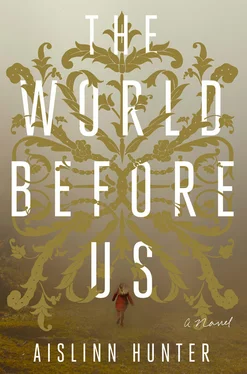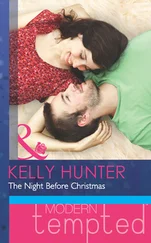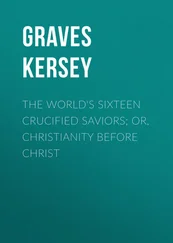“And you actually think you’re fit for the job?”
“As fit as you.”
“As fit as me? Sorry, but we are not equals, John ,” the theologian said. “I am not like you.”
“Meaning?”
“Meaning I’m not mad.”
A woman in a light-pink summer jacket who’d been sitting at a table by the door walked through the group of us toward the loo. We shuddered, could smell the laundry soap on her clothes, the trace of a lemon wedge on her fingers. Whenever a physical form moved quickly through our throng — or we through it — a feeling of disarray came over us.
“What’s ‘mad’?” asked the girl.
“Or who,” said the poet.
“It’s a kind of preoccupation,” said the one with the soft voice.
“It’s everything-all-at-one-time,” Cat added.
“Well, we have that in common,” John said, watching the door the woman in the pink jacket had gone through. “We’re all susceptible to moving forms, which means we’re all—”
“ Twoo, twoo, ” insisted the voice by the cigarette machine.
“Dear God,” said the musician.
And the arm waving started again, except this time Cat joined in, and then John, and even the boy cried caw-caw as he staggered around the pub like a monster.
Jane takes a glass of white wine from a waiter’s tray and wanders to the back of the hall to stand by the Vlasak cabinet while she waits for the lecture to start. She can see Gareth milling around by the bar, sipping Mortlach from his private stash and chatting up Randall Wood, the Chester Prize’s co-founder. A few acquaintances from other museums come by to talk with Jane, stay for a minute or two asking after work prospects, and then, finding Jane anxious and distracted, excuse themselves to circulate amongst the crowd. When no one is looking, Jane turns toward the side of the mahogany cabinet and drains the last half of her glass of wine, closing her eyes at the calming effect.
“Brilliant,” the theologian says. “Here we go again.”
“Wouldn’t you?” Cat snaps. She moves toward Jane, as if to put her arms around her.
A few minutes later, Gareth passes through the crowd near Jane and raises a hand in greeting; his tufty white eyebrows flare up as if to say, What are you doing back here? Then he slips between a woman in a red jacket and a man in a grey suit, moving in the direction of the main door. Jane calculates that he’s probably seen William arrive and is going to greet him. She starts for the bar.
“What do we do?” Cat asks.
“Abandon ship,” the musician says.
“ Ka-pow, ka-pow ,” shoots the boy, and the girl standing next to him whispers, “Stop it.”
“And the handbook says?” This is the theologian’s favourite quip, his way of taking pleasure in our confusion, as if there were a handbook, as if we could even open it if such a thing existed.
“We stay with her,” the one with the soft voice says, and the poet throws his arms overhead and intones: “And so to enter the last chamber of the ungated world.”
When Lewis came back from the bar that day at The Lamb, dropping a last round of pints on the table and plunking himself down on the bench, Jane closed her eyes tight and said the one thing she’d been holding back. “William Eliot’s written a book.” Then she opened an eye to gauge the expression on his face.
When Jane was growing up, Lewis was the only person other than Clive who’d let her talk openly about what had happened with Lily. But ever since he and Natalie had the girls, she’d been unsure how the mention of Lily would sit with him. As soon as William’s name was out of her mouth, she was sorry she’d said it.
“A book on what?” Lewis looked peeved.
“Victorian plant hunters.” She moved the pint Lewis had set in front of her closer and a dollop of stout slopped over the side.
“And?”
“And nothing.” Jane tugged a few napkins out of the dispenser to wipe up the spill, and then, without looking up, added, “He’s giving this year’s lecture at the Chester.”
“Oh. I see.” Lewis tilted his head to try to catch her eye; it reminded her of when she’d go to his house for curry night, how she’d notice him trying to calculate whether she was on her third or fourth glass of wine. “You want to talk about it?”
“I’m sure it’ll be fine. We’ll say, ‘Heya,’ there’ll be a load of Rhododendron prattle, that kind of thing.”
“Naturally.” And that’s when Lewis asked if he should come, and Jane said she’d be okay without him.
“Mostly it’s just got me thinking,” she said. “I’ve got all that research on rural asylums — you know that paper I was working on? Maybe I could write a book.”
“A book?”
“On the Whitmore and the mystery of N. You know, the problem of the historical record.”
Lewis placed his head in his hands. As if he was tired, as if he had been listening to her make things up for a hundred years, as if he was bored of watching her try to copy everyone else, as if she’d never find something of her own.
“I could do it,” she said.
Lewis drained his pint and then patted his jacket pockets to locate his keys. He said, quietly, “I didn’t say you couldn’t.”
We remember the exact moment Jane brought up the idea of the book. We remember it because we thought it would change things.
“Did you hear that?” John asked.
And those of us who’d wandered away from the snug turned our attention back to the conversation. We had been distracted by a couple at the bar having a row about where they wanted to holiday and if they could afford a five-star. The boy, who was fluttering the specks of salt on the table, stopped when the theologian stood over him.
“Hear what?” we asked, some of us still weighing the pros and cons of a beach hotel in a country whose name sounded like white sand.
“She was talking about the Whitmore; she said she might write about it.”
“How long ago was the Whitmore?” Cat asked, trying to splay time into a chronology. “And what came first?”
“A waterfall,” the boy said.
“ Tweep tweep, ” called a voice from the other side of the room.
“Magpie!” shouted the musician.
The theologian interjected. “I think the woods were first.”
“Was it a hundred years ago?” we asked, because we easily forget numbers.
“Once again, time is relative,” the idiot said, and the theologian grunted.
“The dates are in Jane’s book,” the one with the soft voice said, and then Lewis stood up and we stopped our bickering.
“I wish,” Cat said, looking at the receipt Lewis had left on the table, “that we could write things down like people do. I forget sometimes what matters to me and what matters to everyone else. How can we figure anything out if we all start thinking we like stout, or—” She gestured to the girl, who’d wandered off toward the bright flickering keno lights. “That we like bedtime stories, or—” She lifted her hand toward the boy kneeling on the bench near the window.
“Dogs. I like dogs.”
“Exactly.” She sighed. “See? I think I like dogs too.”
“Maybe you do,” John said, “maybe we all do. Suppose it’s the why that matters.”
“ Why I like dogs?”
“Yes. Why.”
“Terriers,” the boy said, staring out at the playing field through a pane of yellow stained glass, “I like terriers.” He turned toward us. “Have I said terriers before? Or just dogs?”
“Terriers,” we all replied.
“Which is why we have Jane,” John said, watching her as she shrugged on her cardigan. “Even if we could write ‘terrier’ down on a notepad we’d probably forget we’d done it or where it got put.”
Читать дальше












